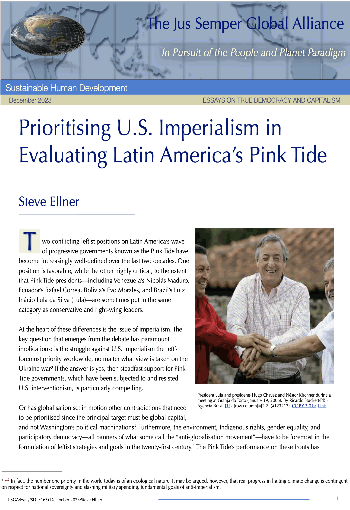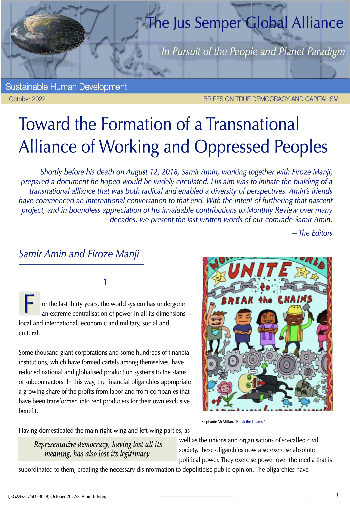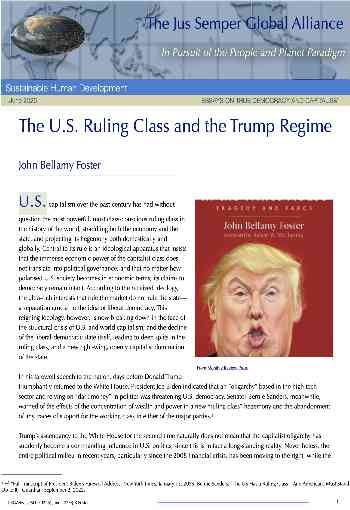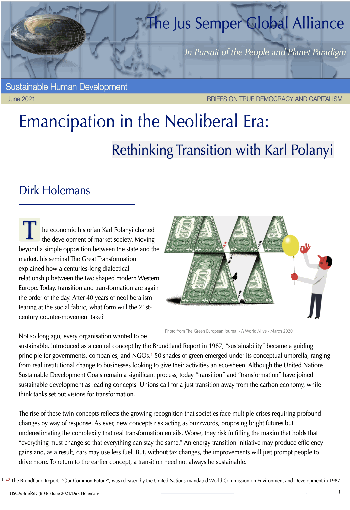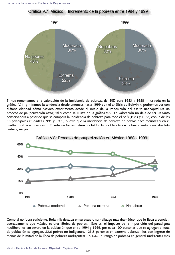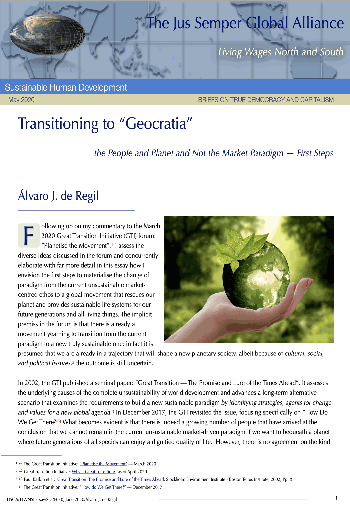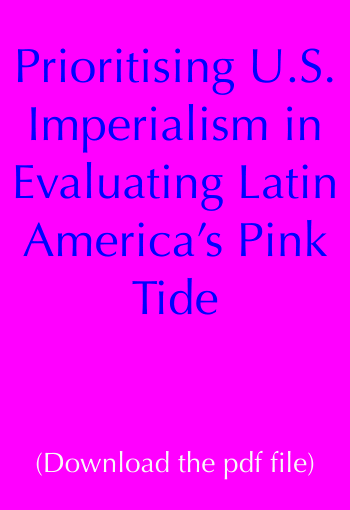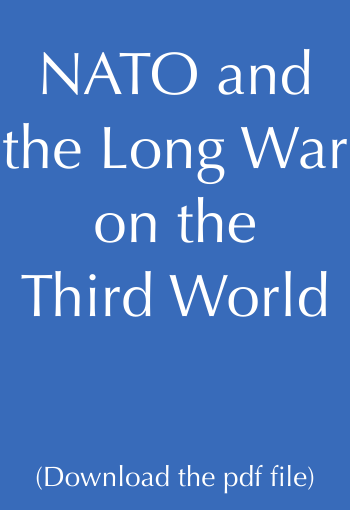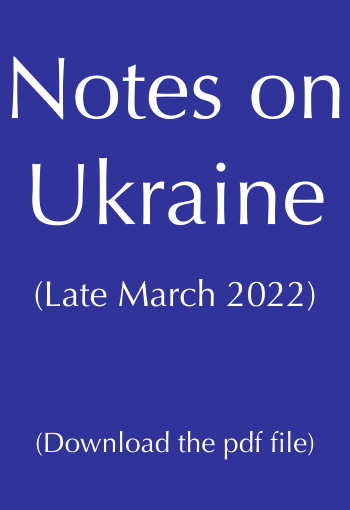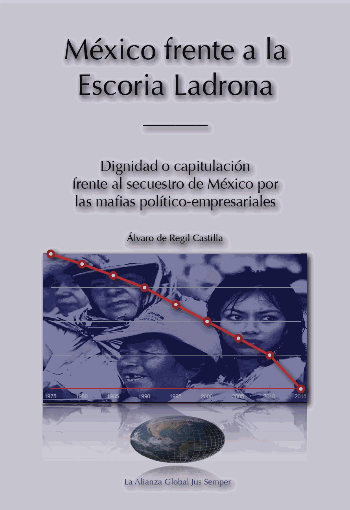Neoliberal Injustice Through Undemocratic Ways One of the fundamental reasons for opposing neoliberal globalisation is the absolute absence of a democratic process in its implementation. It is evident that the paradigm is inherently unjust and is generating tremendous inequalities everywhere, for it is a self-serving paradigm for the centres of economic and political power. Thus, neither the people of the nations in the North nor those who live in the South were asked to approve this particular kind of market economy. Instead, the centres of power and their partners in the periphery have imposed neoliberal globalisation without the slightest trace of democracy in the process. Globalisation, indeed, is intrinsically antidemocratic, for its meaning opposes the concepts of diversity of choice and of collective decision making. And the governments of most so-called "developing" economies have accepted and, in many cases, embraced Neoliberalism because they seek to remain in power, obtaining their legitimacy by supporting the global economic agenda of the G7 rather than drawing their legitimacy from their constituents. Globalising the Mockery of Democracy
In this way, the exploitation of the South occurs because the original principles of democracy have been completely corrupted everywhere. The little democracy that still exists is limited to the electoral process, and, even this, is increasingly rigged even in the so-called matured democracies, as the world witnessed in the 2002 and 2004 federal elections in the U.S. The old Greek agora, that place where society is supposed to settle the conflicts between the public interests and the private interests, no longer exists because most interests have been privatised and governments now discuss them in private with the owners of economic power. What we are experiencing instead is a "corpocracy" or "oligocracy". Indeed, not even taking into account all the constant violations of the most basic human rights, the peoples in the South are suffering from a complete betrayal of its governments on the economic side, a behaviour that constitutes an outright theft and an enormous crime against their civil societies. In order to secure net inflows of capital to service their debt loads, keep the economy running and remain in power, governments have enthusiastically accepted the conditions for complete neoliberalisation of their economies demanded by the so-called institutions of the Washington Consensus: the IMF and the World Bank, in exchange for so-called monetary and development assistance. In this way, the governments of these nations have very enthusiastically promoted, amongst multinationals in the North, the exploitation of their labour force as a commodity readily available. They have strategically positioned their countries as suppliers of cheap "efficient" labour by systematically depressing their labour endowments and, thus, they have consciously and systematically impoverished their populations in order to remain in power. This constitutes, in effect, the restitution of the old centre-periphery relationship between the local oligarchies in the South and the centres of economic power in the North, which has made possible the occurrence of recurrent colonial and neo-colonial eras since the times of Mercantilism.
Top Nonetheless, the centres of power and their partners in the South like to call this oligocracy a democratic process, but this is nothing more than the complete globalisation of the mockery of democracy. The most basic obligation of every democratic government, to procure the welfare of all ranks of society, has been absolutely betrayed, for the zero-sum game where global corporations obtain from governments the most competitive environment for them to thrive, in exchange for monetary contributions, goes directly against the basic principle of democracy of procuring welfare for all. Even worse, neoliberal globalisation has exposed the United States, its leading proponent, as a rugged empire that will take extreme unilateral actions to impose on the world its national interest, ergo, the economic interest of its global corporations. In this way, the confidence in representative democracy has reached its demise on a global scale, for we live in a global corpocracy with new rules dictated by the institutional investors who amassed global capital and owned the global corporations. Inequality is Never a Choice While Coexistence is
We should bear in mind that a central principle of democratic life is that capitalistic values cannot prevail over democratic values and the moral value of human solidarity, because people do not have the same opportunities and do not compete on equal terms. People do not choose the socio-economic and political conditions where they are born. Thus, if we aspire to a peaceful coexistence of all cultures, we cannot allow a kind of Capitalism where the economic survival of the fittest prevails, for if we reject human solidarity and peaceful coexistence, we can only expect unrelenting conflict and human destruction. To be sure, we are increasingly witnessing an explosion in conflict, not just between the world's regions and cultures, but also within nations, which are experiencing high levels of social dissolution because their governments have mocked democracy and are looking out only to protect their very private self-interests. The emergence of true democracy
The mockery and worsening state of representative democracy is beginning to generate an unprecedented backlash worldwide. The energy released with this backlash is directed at creating a new paradigm that responds directly to the people to create a direct and participatory democratic ethos. The major factor that acts as the catalyst for this backlash is the prevailing imposition of the private interests of the centres of global capital on the public interest of societies and on its hypothetical pursuit of the welfare of all members of society.
The imposition of the logic of the market, in line with the interest of its major participants, in the most perverse and pervasive manner on the livelihoods of societies worldwide, is engendering a social reaction that places the social, economic and environmental responsibilities of business at the forefront of the global movement to completely redefine the purpose of democracy and democratic societies. People take conscience that the only way to redefine the purpose of democracy in a comprehensive manner, for the benefit of all its stakeholders, is by transforming the purpose of business (Corporation 20/20: Principles of Corporate Redesign). As a consequence, there is a complete redefinition of the meaning of business and its purpose at the deepest level . It becomes evident that this is a sine qua non event in order to redefine democracy and the purpose of democratic societies.
Top
The current meaning of development is a direct result of shareholderism, of the corruption of the political class and of the alienation of people through the promotion of a culture of irrational consumerism, vacuity and individualism, which are ultimately engendering anomie: a complete breakdown of the social fabric with rampant despair, conflict, and deviance. This is engendering a tremendous degree of social dissatisfaction. People are getting completely fed up with their so-called democracies and are already mobilising to exert change. The case of Mexico since 2006, where over one-third of the population does not recognise the current government as a legitimate power and has organised to oppose it and denounce its actions in many aspects of public life is a clear example of this reaction. If this trend continues, which is very likely, it will result in a social backlash worldwide to the current structures of government with the explicit demand to redefine the meaning and purpose of democracy and the role of business in favour of a real democratic ethos. One current event exposing this great exasperation is the violence that sparked in over 300 cities and towns in France in 2005, due to the overwhelming feeling of exclusion, of great frustration and impotence among the poor, both native and immigrant.1
Re-enunciating democracy
It is evident that because the role of business and its pervasive influence on the lives of all is at the centre of the growing social, economic and political conflict in many nations, the social and environmental responsibilities of business will be at the forefront of the struggle. Yet, the social backlash will be aimed directly at the structures of power, especially at the so-called structures of representative democracy for betraying their commitment to procure the common good. The root of the problem is not with the market per se, but with the institutions that are suppose to control it in favour of society. In this way, redefining the meaning and purpose of business in the 21st Century will be, to be sure, fundamental, albeit only part of a complete redefinition of the philosophical pillars of today’s so-called democratic and market-based societies so that we can aspire to build an entirely new paradigm for humanity, not market based but people and planet based. It would imply readdressing, re-enunciating, core values such as democracy, the sovereignty of nations, capitalism, property, liberalism, the precedence of both individualism and community; it would define the terms of an entirely new social contract.
In this scenario, representative democracy will no longer exist, as we know it today. The people will gradually, as is already occurring, get involved in every aspect of the public matter; gradually taking much of the initiative by originating many of the ideas and concepts that will be funnelled to the legislatures to prepare initiatives after they have been debated directly by the people in citizen forums. There will be a concocted and productive relationship between regular citizens and their representatives in parliament that does not exist today. People will participate on a regular basis in the legislative process to make democracy genuinely direct and bottom-up. Citizens will closely monitor all branches of government. Corruption, a key factor in the dismal state of the world, is greatly diminished. Referendums will become a fundamental resource at the forefront of the democratic process without which no public decision, with a reasonable degree of impact, could be taken. All elected public servants, including presidents and prime ministers, will be subject to plebiscites periodically, during their terms in office, to allow the people to confirm or expel them from office.
Several nations in South America –namely Bolivia, Venezuela and Ecuador– have already instituted this process of public confirmation. Another paradigmatic example of a demand for a direct democratic process is the enormous social pressure in Mexico to force the current executive and legislative branches of government to open the debate about the governments proposal to change federal laws governing the energy sector –to allow private participation– to a public debate and to an actual referendum. This demand actually bypasses the decisions of a Congress that is largely discredited and regarded to be acting as an agent of foreign and private interests by very large sectors of society. Yet, despite the obvious opposition of the federal government, unprecedented social pressure has already prompted the mayor of Mexico City to announce that he will carry out a referendum concerning the future of the oil industry in July 2008, and is calling on all state governments to join to organise a national referendum.2
At the global level, multilateral organisations will be revamped in congruence with the new real-democracy ethos or they will cease to exist and be replaced by new truly democratic entities. The UN, already gravely questioned and vilipended by many of its members, would have to become a truly democratic body or cease to exist. If it survives, it will operate as a truly democratic global forum with no veto power for any nation. Other institutions, such as the Bretton Woods institutions, will be reformed or cease to exist as well. If they are reformed, the one-dollar-one-vote system will be replaced by a democratic one-country-one-vote system, with no veto power for any member State. Laws governing businesses become universal and govern the social, economic and environmental impact of their activity with a focus on the procurement of the common good through the construction and preservation of a new sustainable paradigm. In a globalised world, one single framework of business standards, governing the tridimensional impact of business is put in place.
To be sure, MNCs as well as domestic companies pay living wages North and South, respect all human rights and sustain the environment. A universal living wage, based on “equal pay for equal work of equal value”, is enacted and revised annually. There is an agreement among nations that, not only because of a moral question of social justice but also because of the need to create wealth, make economic growth sustainable and achieve real development, people need to earn a living wage so that a rational aggregate demand is generated and sustained. Yet, this does not imply at all economic growth per se indefinitely. Thus, consumerism and waste are also reined in through legislation and the development of a culture that deters excessive and irrational consumption and individualism and promotes a culture of solidarity and preservation of our natural resources. A completely new sustainable ethos begins to emerge.
What is a fact today, is the worldwide growing disillusionment and the increasing conviction that the responsibility to build and maintain egalitarian and truly democratic societies resides permanently with the people and not with the political class. There was hope but there is none now in today’s institutions. In this way, people are gradually realising that we are the only ones capable of changing the pillars of society and that we have the power to build a new paradigm. In the broadest sense, we are redefining democracy, development and progress. Undoubtedly, it will take at least a generation to learn if we will succeed in building a new egalitarian and sustainable paradigm or if we let the perverse forces of humanity bring everything down to our complete demise. Yet, we better succeed, for our very survival and of our planet is at stake today.
1. Agnès Poirier, It isn't our republican model that has failed, but France's mediocre and prejudiced political elite, The Guardian, 9 November, 2005.
2. Habrá consulta sobre Pemex en el DF; pide Ebrard rechazar plan calderonista. La Jornada, 30 de mayos de 2008. Top |



